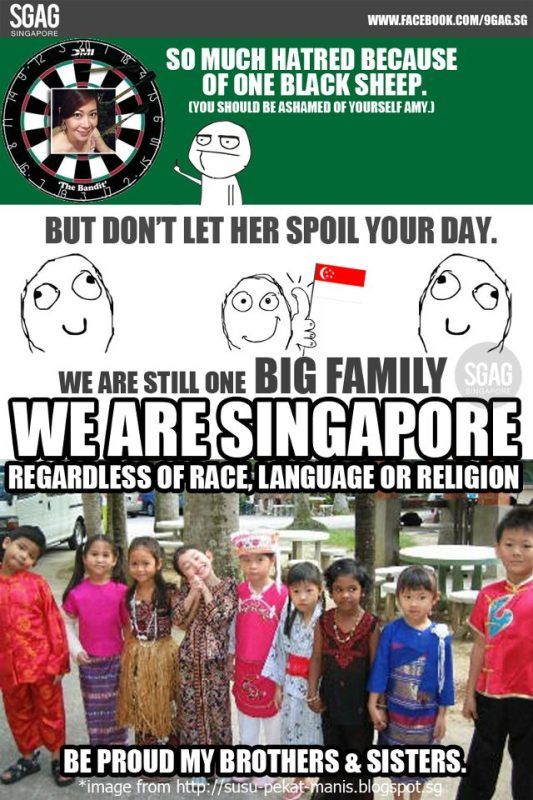Picture credit: http://asiasingapore.blogspot.sg/2012/10/ntuc-fired-amy-cheong-for-racist.html
The recent Amy Cheong incident comes as no surprise to me and I believe many others in Singapore society. For one, such racist rant on social media is not a first and no longer an unthinkable taboo. It comes as no coincidence that I have recently been thinking and writing about the culture of hate and the impact of the social media platform. These are institutions tightly related to one another; giving rise to one another.
To expand my own reflection about this issue, I spoke to my dad whose perspectives I cherish as a well socialised member of the previous generation. To dad, such an outburst is completely pathological and his rationalization of the act was that to some extent, Amy “must be crazy” as any sane person would surely have known that he/she can “never talk about race in this manner in Singapore”.
My dad’s perspective is a completely logical presentation of Singapore society of the previous generation. Socialised in the way of racial harmony – fully aware of consequences of a multicultural society that does not live with respect for one another. This institutionalized norm that is so well socialised in him and many others sets up the context for us to think about this present generation – let’s call ourselves “the status generation”.
I use the term “status” because of how prevalent this notion of updating status on the internet has become – whether it is through microblogging on Twitter, Facebook updates, Instagram, Tumblr, etc.. you get the picture. We are a generation that seems to (I am obviously lacking empirical evidence so I want to stress that this is just a personal reflection and I hesitate to generalize) want the world to know what’s going on in our lives – as far as possible.
It is not difficult to argue this point simply because so many of us subscribe to it (myself included) – consciously or subconsciously – and it is fast institutionalizing into a norm of status update rather than a purposive and narcissistic showcase of self to the world. This has come to a point whereby a person who is completely inactive on Facebook or Twitter would be known as someone who has “completely disappeared from the face of the Earth”.
This brings us back to the Amy Cheong incident. Setting up the premise of this article the I have done is not my way of defending Amy Cheong’s actions as an outcome of society and institutions. On the contrary, I am completely against what she has done and there is absolutely no excuse that she could come up with that would allow her to get away with her actions (of course this doesn’t necessarily means she ought to be harshly sanctioned as a example to Singapore society – we are more liberal than that). I have set up the premise in this way because I want us all to look at all the possible mechanisms in the current Singapore society that have propelled such racial or general outbursts to occur on a more and more frequent basis. So for a start, let’s focus on the institutions.
As I have argued thus far, our “status generation” has normalised updates regarding personal opinions and issues but not remove our consciousness from basic social decorum such as upholding racial harmony. However, there are institutions in place that have inadvertently encouraged and increasingly normalised the expression of disdain in Singapore society and one such example is STOMP.
For all those reading this that aren’t familiar with STOMP, it is a citizen-journalism website with user-generated material fuelling its readership. While its bottom-up approach to hearing the voices of the people is recommendable, it has created a community where people can share pictures and thoughts of acts in public that are perceived as undesirable; usually in a voyeuristic and anonymous fashion. Increasingly, this culture of sharing is being institutionalised and the support of others within the community for certain issues have given many Singaporeans the moral courage of openly expressing their disdain for others away from this parent medium of STOMP.
Of course, this is all a personal analysis of the situation at hand and many may disagree and argue the positive aspects of such a community. I do not disagree of these positive aspects but at present, we have to acknowledge the impacts of all influential institutions on our civil society.
Having discussed examples of institutional influence, we have to analyse Amy’s actions for what it is. Racism. Fundamentally, humans are ethnocentric creatures with empathy. While there may be cultural performances that are difficult to comprehend or accept at first glance due to our ethnocentric instincts, our rational and empathetic minds would easily bring us to a positive resolution. The problem is that the issue which Amy gave such a strong reaction to was neither difficult nor foreign to any person in any society. It is a simple celebration of love that is recognisable in all forms and all types of ceremonial celebrations. The fact that Amy has failed to appreciate a celebration of love and chose to express disdain over it shows the possible problem which may arise from our progressive society.
I argue that there is a rising class within the middle class – the educated middle class – that has a shared consciousness and belief that they are above the rest of society in terms of absolute knowledge. When this class of people argue, they leave no room for others to voice their opinions as they are in the belief that they knowledge is flawless and their opinions are right simply because it is their opinion and they are too well educated to be wrong. This is one of the unintended outcomes of our knowledge-based society.
To me, being educated is a gift – a gift that does not justify dismissal of culture or others alike. The truly learned will understand that there is no knowledge that is complete and in every discourse, there will be room for debate. No one person in the world will possess such absolute knowledge to dismiss others as insignificant or unworthy. Yes, we are backed by google; yes, wikipedia says so much; and yes, infinite information lies at our fingertips via the internet. Such power from knowledge should be pushing us towards a more understanding and empathetic society as it is ever so easy now to gain contextual knowledge of any culture or tradition that we may fail to comprehend at first glance.
We are the educated generation that can contribute positively towards the progress of societies in general and as a start, we should acknowledge that as citizens of this civil and educated society, we are all equals that can benefit and learn greatly from one another’s cultures to become more diversified in our identity and ever more depth in our characters.
It is always easy to criticise – especially when a particular incident is blown out of proportion and expression of anger is just jumping onto the bandwagon that was well on its way. What is difficult is showing tolerance in the face of absolute ignorance and using such a challenging time to reflect on our own positionality within this educated society – to ensure that we do not fall into the trap of taking the moral high ground and yet fighting hate with hate – intolerance with intolerance.








